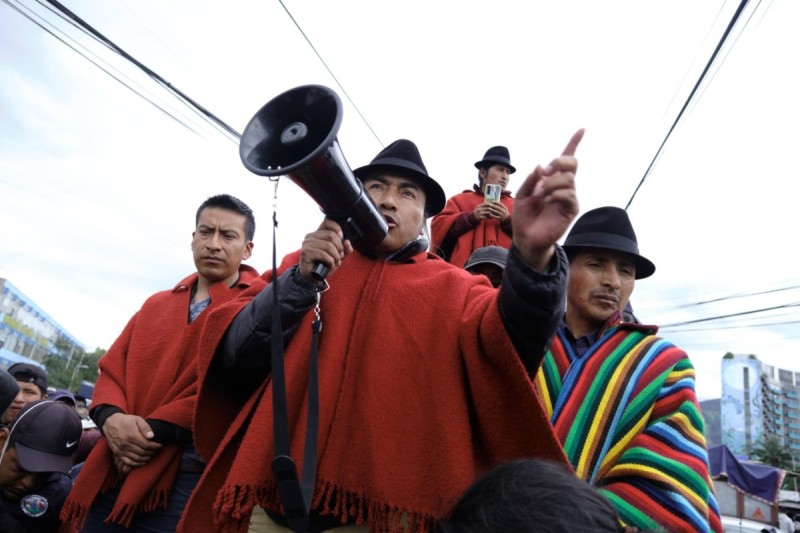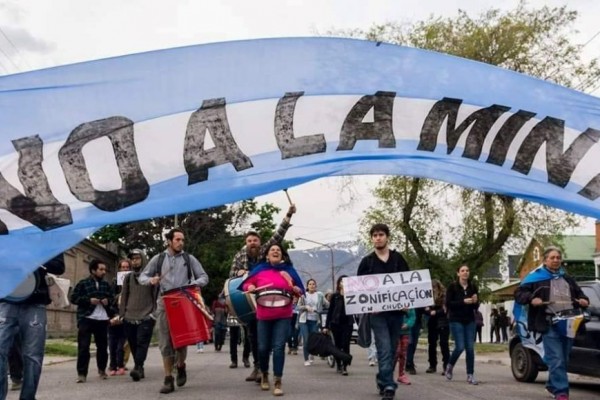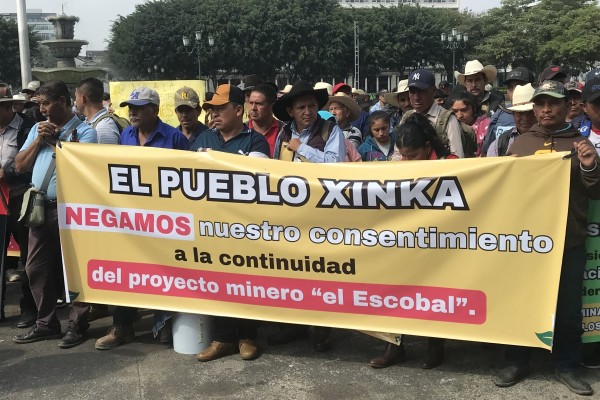Despite protests, Ecuador’s Guillermo Lasso embraces Canadian mining at the expense of Indigenous peoples
Canadian direct investment in Ecuador is $3.7 billion, roughly 4% of Ecuador’s entire GDP
Indigenous PoliticsCanadian BusinessLatin America and the Caribbean

Leonidas Iza Salazar, President of Ecuador’s Indigenous umbrella organization CONAIE, during nationwide protests in June 2022. Photo by Nico Kingman/Amazon Frontlines.
This June, Indigenous-led protests erupted across Ecuador in rejection of President Guillermo Lasso’s neoliberal economic agenda, which was failing to address the severe cost of living crisis, especially in relation to food and fuel shortages. In many ways, these anti-austerity protests were a continuation of those that occurred under the preceding right-wing president Lenín Moreno in 2019.
Extractive industry was a focus of the June protestors, who demanded an end to mining concessions on Indigenous lands. During the height of the protests, Acción Ecológica, one of the largest environmental organizations in Ecuador, released a statement condemning the government’s prioritization of and collusion with transnational mining companies at the expense of local development:
The State is playing a role by colluding with, being complicit in, and negligent towards the destruction of the systems that generate livelihoods alternative to “mineral development.” [These alternatives] are autonomous and capable of existing without causing harm… By participating in the national strike, the communities who are resisting mining are expressing their rejection and indignation against all attempts to silence their reality. They demand that their rights be respected.
Acción Ecológica points out that 15 percent of land in Ecuador is subject to mining concessions and that three million hectares have been identified for further exploration. Amazon Frontlines asserts that 28 percent of all mining in Ecuador is conducted on Indigenous lands.
Canada is the largest foreign investor in Ecuador, due primarily to the mining investments of Canada-based companies. In total, Canadian direct investment in Ecuador is $3.7 billion, roughly four percent of Ecuador’s entire GDP. Since 2017, Canadian direct investment in Ecuador has tripled, and the Trudeau government has emphasized the importance of Canadian mining companies in this regard. On April 8, Canadian Trade Minister Mary Ng spoke with Ecuador’s Minister of Production, Foreign Trade, Investments and Fisheries, Julio José Prado, and highlighted the importance of “responsible [Canadian] investments in the mining sector.”
Roughly two months after Ng’s visit, Ecuadorian activists, mainly those of the Indigenous-led social movements and the Confederation of Indigenous Nationalities of Ecuador (CONAIE), rose up in renunciation of the economic order that Canadian companies benefit from immensely. The Canadian Embassy in Ecuador responded by degrading the progressive protests as “violent riots,” mimicking the dehumanizing rhetoric of the Ecuadorian right. The Canadian government didn’t say a thing when the state arrested Leonidas Iza, the president of CONAIE, without charge, or when the police killed multiple protestors, or when Ecuador’s Alliance of Human Rights Organizations denounced the repression as a “massacre.”
When the protests persisted through Lasso’s violent response, his administration agreed to implement some much-needed reforms in the mining sector, which his government claims will improve water protections, end illegal mining, and make mining investment in Ecuador “environmentally and socially responsible.”
Many Indigenous activists say these reforms are wholly insufficient and not well-intentioned. For their vocal rejection of Lasso’s continued embrace of transnational mining companies, many face death threats. In August, Amnesty International called on government officials across Latin America, including in Ecuador, to protect environmental defenders from violence and murder. They specifically urged the Ecuadorian state to “impartially investigate” threats against Lina María Espinosa, a senior attorney for Amazon Frontlines.
#Ecuador
— Amnistía Internacional Perú (@amnistiaperu) August 11, 2022
Amnistía Internacional demuestra preocupación por la situación de seguridad de la defensora Lina Maria Espinosa, abogada defensora de derechos humanos, en particular de los pueblos indígenas y el ambiente.https://t.co/VVadBJZE21
Espinosa has pointed out that Lasso’s mining reforms do not include the right to prior consultation for Indigenous peoples, which was one of ten demands put forward by CONAIE during the protests. Additionally, the Ecuadorian government continues to incentivize transnational mining investment, the largest proportion of which originates from Canada.
“The other important point is that [the prior consultation] has been designed to favour, to facilitate, even to incentivize business,” said Espinosa. “So what they’re looking for is to adapt, make flexible and favour administrative procedures so that mining capital flows into Ecuador and investment development comes to Ecuador. That obviously goes against the rights of Indigenous peoples.”
At the same time that Lasso refuses to address deficiencies around the right to prior consultation, he has announced an ambitious plan to increase Ecuador’s mining exports by 34 percent by the end of 2022. This growth will be driven by Canadian-owned mines, including Lundin Gold’s Fruta del Norte (the largest mine in Ecuador) and the Curipamba mine, owned by Canada’s Salazar Resources and Adventus Mining, currently in development. Two other mines in development, La Plata and Loma Larga, are also owned by Canadian companies—Atico Mining and Dundee Precious Metals, respectively. Furthermore, Canada’s Lumina Gold will soon begin extraction at Ecuador’s Cangrejos mine.
The 2022 national protests against neoliberalism in Ecuador were a powerful statement in opposition to the economic, political, and social status quo that is favoured by Ecuador’s conservative elite and the Canadian state. While the protestors achieved some important gains, Lasso’s continued embrace of foreign mining investment at the expense of Indigenous peoples may be doomed to incite another uprising of the type seen in 2019 and 2022.
Owen Schalk is a writer based in Winnipeg. He is primarily interested in applying theories of imperialism, neocolonialism, and underdevelopment to global capitalism and Canada’s role therein. Visit his website at www.owenschalk.com.










